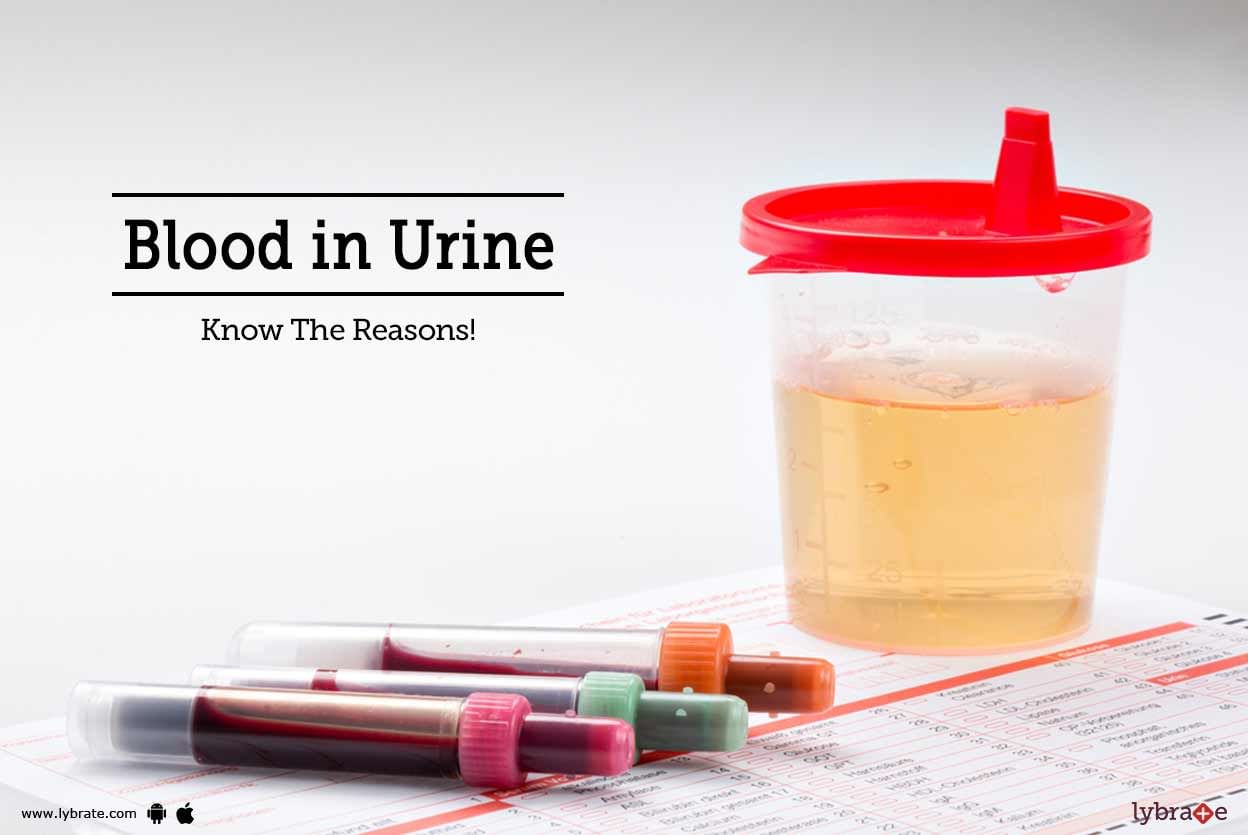Get the App
For Doctors
Login/Sign-up
About
Health Feed
Find Doctors
Health Packages
Blood Image Tips
Last Updated: 7 years ago• Featured Tip
Share
Bookmark
Report
If there is blood in your urine, it is a sign of renal illness. While this could be happening because of various reasons, it is advisable to see your doctor soon.
Following are the causes of blood in your urine:
An enlarged prostate - An enlarged prostate is a common cause of the appearance of blood in the urine in men who are in their middle ages or older. Enlargement of the prostate gland causes the urethra to be compressed. This prevents the urethra from getting fully emptie...more
Following are the causes of blood in your urine:
An enlarged prostate - An enlarged prostate is a common cause of the appearance of blood in the urine in men who are in their middle ages or older. Enlargement of the prostate gland causes the urethra to be compressed. This prevents the urethra from getting fully emptie...more
Last Updated: 7 years ago• Featured Tip
Share
Bookmark
Report
If there is blood in your urine, it is a sign of renal illness. While this could be happening because of various reasons, it is advisable to see your doctor soon.
Following are the causes of blood in your urine:
An enlarged prostate - An enlarged prostate is a common cause of the appearance of blood in the urine in men who are in their middle ages or older. Enlargement of the prostate gland causes the urethra to be compressed. This prevents the urethra from getting fully emptie...more
Following are the causes of blood in your urine:
An enlarged prostate - An enlarged prostate is a common cause of the appearance of blood in the urine in men who are in their middle ages or older. Enlargement of the prostate gland causes the urethra to be compressed. This prevents the urethra from getting fully emptie...more
Last Updated: 8 years ago• Featured Tip
Share
Bookmark
Report
Blood in semen occurs due to a variety of factors. It is also called 'hematospermia.' It mainly affects men after 30 years of age. After 50 years of age, blood in semen is caused due to prostate enlargement. Blood in semen is caused due to injuries, inflammation and blockage near the male reproductive system. Blood in semen can be linked to other diseases which might not be known by the affected person.
What can cause blood in semen?
Blood in semen can be caused due to infectio...more
What can cause blood in semen?
Blood in semen can be caused due to infectio...more
Last Updated: 8 years ago• Featured Tip
Share
Bookmark
Report
Unexpected or abnormal vaginal bleeding usually refers to the kind of bleeding that occurs any time outside of the normal time of menstruation. Also termed as spotting, inter-menstrual bleeding or metrorrhagia, bleeding between periods always calls for extra measures to be taken against it, and is a matter of serious concern.
The primary causes for unexpected vaginal bleeding generally are:
An imbalance of progesterone and estrogen levels triggered by a variety of causes like ...more
The primary causes for unexpected vaginal bleeding generally are:
An imbalance of progesterone and estrogen levels triggered by a variety of causes like ...more
Last Updated: 7 years ago• Featured Tip
Share
Bookmark
Report
Blood in urine, medically known as Hematuria is not usually a cause of concern, but it can translate into an adverse condition if left unevaluated. The kidneys and other structures in the urinary tracts such as urethra (tube connecting the bladder to the outer part of the body); bladder (that stores the urine) and ureters (tube joining the bladder to the kidney) are the sources of blood flow to the urine. Hematuria can be accompanied by symptoms such as discharge of tea-colored, brownish-red or ...more
Last Updated: 7 years ago• Featured Tip
Share
Bookmark
Report
Gastrointestinal bleeding, as the name suggests, is characterized by bleeding in the gastrointestinal (GI) tract and its accessory organs (esophagus, stomach, colon, small intestine, rectum, and anus). The bleeding also referred to as gastrointestinal hemorrhage, is not a disease in itself. However, it may be an indication of a disease, injury or infection in the digestive tract of a person. The bleeding in the GI tract may be mild to chronic (often fatal), depending on the severity of the condi...more
Last Updated: 8 years ago• Featured Tip
Share
Bookmark
Report
A nose bleed can take place due to a number of reasons, which usually all boil down to acute dryness of the nasal passages. The nosebleed and dryness can stem from sinus, allergic reactions, constant blowing of the nose, infections, and also during very harsh winter months when there is no lubrication in the nose. Nose bleed can also occur due to conditions, such as high blood pressure and when a foreign object gets stuck inside the nose.
Here are a few tips on treating nosebleeds:
...more
Here are a few tips on treating nosebleeds:
...more
Last Updated: 7 years ago• Featured Tip
Share
Bookmark
Report
What is menopause?
Menopause is that phase in the life of a woman when she can no longer reproduce. It involves the loss of fertility and the cessation of the menstrual cycle. The woman will stop bleeding every month and the ovaries stop producing eggs that can be fertilized. Menopause normally sets on after the age of 40 and bleeding may permanently stop by the age of 50.
Post menopausal bleeding
You are known to reach menopause when you have not been bleeding for 1 entire year...more
Menopause is that phase in the life of a woman when she can no longer reproduce. It involves the loss of fertility and the cessation of the menstrual cycle. The woman will stop bleeding every month and the ovaries stop producing eggs that can be fertilized. Menopause normally sets on after the age of 40 and bleeding may permanently stop by the age of 50.
Post menopausal bleeding
You are known to reach menopause when you have not been bleeding for 1 entire year...more
Last Updated: 8 years ago• Featured Tip
Share
Bookmark
Report
A girl s first period or Menarche marks her transition from a girl to a woman . Most girls have their first period between the ages of 11 to 13 depending on their genetic structure, body weight, nutrition and maturity of the hypothalamic-pituitary-ovarian axis. Periods are usually irregular in the first two years and gradually settle into a pattern. Along with the duration of the periods, there may also be fluctuation in the amount of blood being lost. Puberty menorrhagia can be described as ...more
Last Updated: 8 years ago• Featured Tip
Share
Bookmark
Report
What is menopause?
Menopause is that phase in the life of a woman when she can no longer reproduce. It involves the loss of fertility and the cessation of the menstrual cycle. The woman will stop bleeding every month and the ovaries stop producing eggs that can be fertilized. Menopause normally sets on after the age of 40 and bleeding may permanently stop by the age of 50.
Post menopausal bleeding
You are known to reach menopause when you have not been bleeding for 1 entire year...more
Menopause is that phase in the life of a woman when she can no longer reproduce. It involves the loss of fertility and the cessation of the menstrual cycle. The woman will stop bleeding every month and the ovaries stop producing eggs that can be fertilized. Menopause normally sets on after the age of 40 and bleeding may permanently stop by the age of 50.
Post menopausal bleeding
You are known to reach menopause when you have not been bleeding for 1 entire year...more
Book appointment with top doctors for Blood Image treatment
View fees, clinic timings and reviews
Ask a free question
Get FREE multiple opinions from Doctors
posted anonymously





















